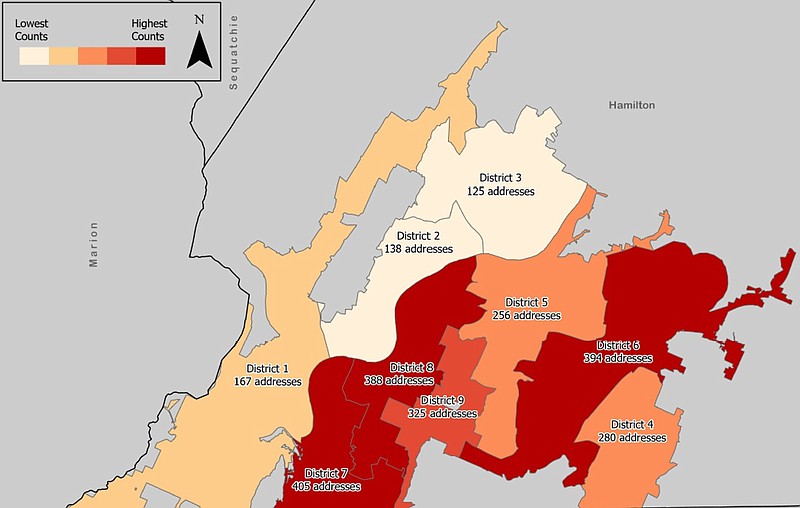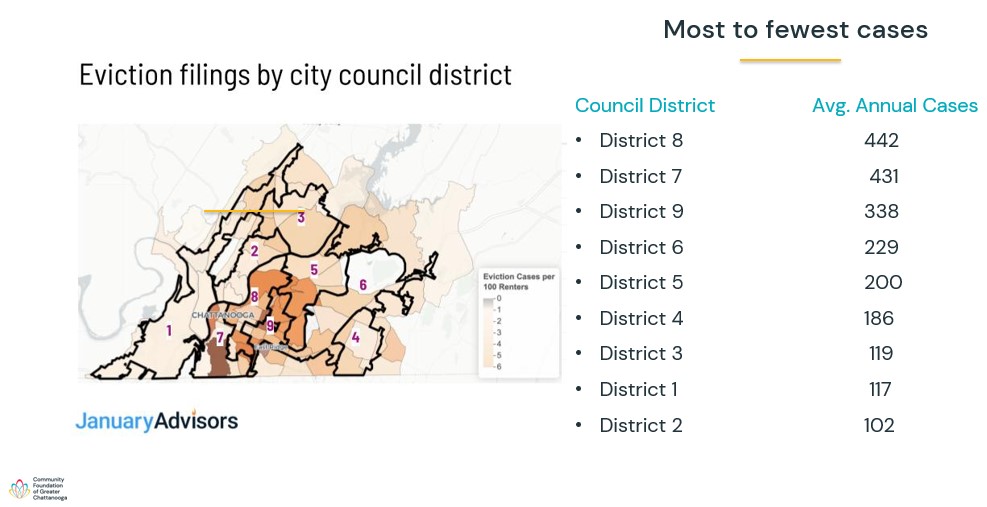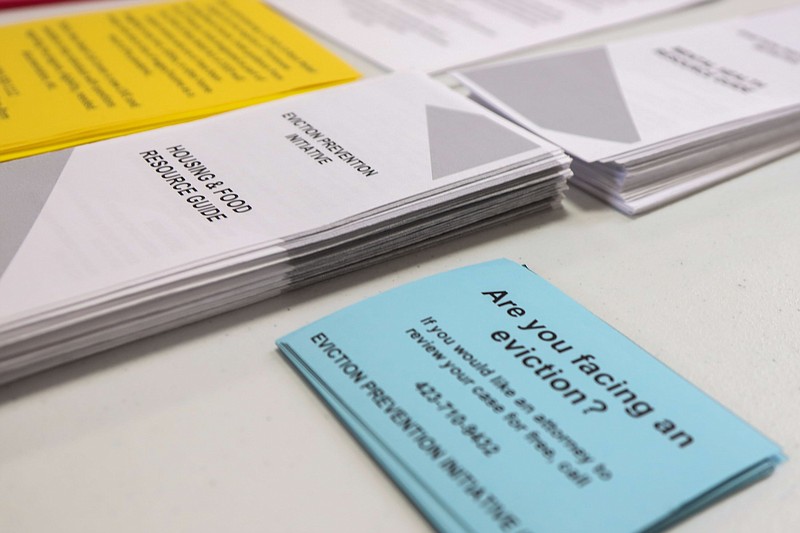In an effort to provide sustained legal representation for the increasing number of households facing displacement in Chattanooga, local groups went to the City Council on Tuesday to push for more than $325,000 for an eviction prevention effort in the city's upcoming annual budget.
The funding would extend an initiative initially funded in 2021 through $1.5 million in COVID-19 relief dollars.
From October 2021 to March, over 515 households and over 800 children in the area have avoided eviction through legal representation, according to Legal Aid of East Tennessee and the Community Foundation of Greater Chattanooga, the two groups that presented to the council Tuesday.
The federal funding for the program is set to lapse in September. The $326,245 requested from the city by the groups would go toward legal representation for tenants facing eviction.
Debra House, executive director of Legal Aid of East Tennessee, said in an interview before Tuesday's presentation that regular funding from the city or another source will be required to continue legal representation for families facing eviction beyond September.
"It's going to take some form of sustainability," House said. "The loss of the project — I would fear for the number of tenants who don't have legal representation. You're back to that confrontational, adversarial system in the courtroom."
According to the presentation, 56% of eviction cases were dismissed in court if the tenant had legal representation. For those without an attorney, 28% were dismissed.
The City Council is set to approve a new annual budget in the coming weeks as the next fiscal year starts July 1.
To advertise the eviction prevention initiative, more than 2,900 postcards containing information on the program have been sent since May to households facing displacement.
To qualify for the program, households make 200% of the federal poverty level or less. Tenants facing eviction can call 423-710-9432 or visit rent423.com for assistance.
Evictions up
Since the onset of the pandemic in 2020, evictions in Chattanooga have ticked upward, according to court data obtained by the groups presenting Tuesday.
From 2016 to 2022, the average number of evictions filed against tenants by landlords each year was 2,164. In 2023, landlords filed 2,478 evictions.
The groups attributed this increase to a range of factors including a spike in rent costs in recent years and the pandemic and inflation more broadly.
"People may have lost their job during the pandemic and still haven't gained full employment," House said. "People who have not been able to advance their education for whatever reason as a result of what happened during the pandemic, not only financially but socially and emotionally for people — those after effects, we're still seeing them."
Maeghan Jones, president and CEO of the Community Foundation of Greater Chattanooga, said in an interview rising housing costs have been a driver of increased eviction filings.
"The increase in housing prices. The impacts of inflation," Jones said. "Wages, in many cases, have not increased at the same pace as those expenses in people's lives, which makes stability more challenging."
(READ MORE: Chattanoogans call for city action on affordable housing crisis)
Economic benefits
According to Tuesday's presentation, it would take about $640,000 annually to legally represent each household facing eviction in Chattanooga, including the existing funding that runs through September and the added funding that's being requested.
That level of funding would create $3.1 million in economic benefits to the community, according to a study the groups released Tuesday. That's $4.84 for each dollar invested.
Keely Gilliland, chief of staff at the Community Foundation of Greater Chattanooga, said in an interview many factors determined that level of economic return.
"A tenant's reduction in their credit score when they lose their eviction case," Gilliland said. "The loss of the subsidized housing voucher or the cost the landlord has when they have to find and vet a new tenant. We also see that there are positive outcomes when we increase housing stability in our community, things like the reduction in the use of court services when there are fewer eviction cases."
'Changes the tenor'
Jones said having legal representation makes court less stressful for both the tenant and landlord on the day of the case.
"It just changes the tenor of that day," Jones said. "It's a very emotional thing to be facing losing your house and moving your family. When you can have trained lawyers coming in and having those conversations — lawyer to lawyer — it takes that pressure off the tenant and the landlord."
Following Tuesday's presentation, council member Darrin Ledford, of East Brainerd, said he supports the program in bettering the relationship between tenant and landlord.
"It absolutely eases tension within that relationship," Ledford said. "It doesn't put them in a flight mode or a fight mode."
Contact Ben Sessoms at bsessoms@timesfreepress.com or 423-757-6354.


